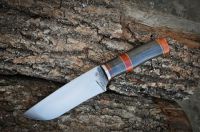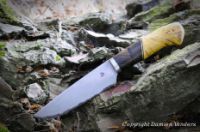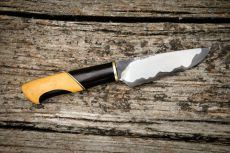





Which Knives?
There are so many different knives, so many ways to make one, that it may be useful to try to explain in a few words my humble vision of this object. I really appreciate the work of knifemakers who produce works of Art, « jewel-knives », « sculpture-knives » (sometimes requiring a hundred-hour work and an expertise I'll probably never acquire). For instance, how amazing is the work of people like Roger Bergh, Gregory Delaunay and so many others. But for me, a knife is a tool and must remain one. Which means it must be adapted to its use, it must be reliable, in other words, it must be thought and made to be used. I make kitchen and table knives, folding knives but, as I practise bow hunting and often go into Scandinavian nature, outdoor knives are those I prefer. For instance, I really like the work of people like Eric Plazen, Laurent Gaillard, Jean Paul Sire and others. Scandinavian knives are probable my favourite. If you really want to use your knife, it must be at a reasonable price. To my mind, 100 to 300 euros for a unique handmade knife is fair. So, except from really special orders, I try to keep this range of prices. Of course, there are some excellent knives for just 20 or 30 euros, and I say this without irony. An Opinel, for example, is objectively a really good knife which will provide 80% of your needs. But we are dealing with unique knives which aren't made in factories. The approach is necessarily different.
How can I define « my » knives ? It is always hard to talk about one's own work but I know what I am aiming at. I want my knives to be convenient, very comfortable to hold, as well as beautiful. For me - don't ask me why - a knife has a handle made of wood, and preferably « lively » wood (burle ; root and so on). I don't like synthetic materials like micarta or stabilized wood. They obviously age better than natural wood but I don't mind. It doesn't matter if a knife acquires a patina or needs to be taken care of from time to time. I prefer warm and lively materials to cold and solid ones. I know that we don't like to see our objects and our loved ones getting old. However, a knife with a wooden handle and a steel blade gets old. It is also part of what makes it unique. A knife will have its own way of ageing ( according to its use ; sharpening etc). The only concession I can make is to use stainless steel (and not just any ! ) for certain kitchen knives or knives used in extreme conditions.
To imagine a shape, I first look for simple lines, well-proven and elegant designs. I don't think I have managed to refine my lines enough yet and I keep on working to that end.
Jérémy Collot
Philosophy
I started making knives several years ago. At first, I didn't realise all the treasures such a simple object could hide. Yet, when you start having a passion for knifemaking, there are so many things to learn, so many possibilities in terms of shapes, materials, designs. You meet so many interesting people among knifemakers, amateurs and customers. Inspired by this world, I've decided to devote all my time to this work. I won't make a fortune but at least I will earn a living doing what I like. I am satisfied to be able to live in accordance with values which are dear to me such as :
- Creating unique objects.
We live in a world where everything is standardized, we all own the same objects. I think it is essential to make what surrounds us wonderful. It is important to give a real identity to the objects that we use. A handmade knife is a knife which was made by a person you can meet ; you know everything from its making process to the materials used to make it : the origin of the wood and steel... This unique knife is also the fruit of a complex work and "savoir faire" (blacksmith work, heat treatments, the choice of woods and steels, the design and ergonomy and so on).
- A different notion of Time.
Each stage in the making process has its own temporality : hand-polishing a blade, revealing damascus steel, putting the finishing touches to a handle... Each operation has its own rhythm. It requires time and it is therefore necessary to be out of the drive to ultraproductivity. Living while giving oneself time to do things well has become a luxury which is important to defend.
- A permanent quest.
Trying to improve all the time, confronting our ideas with the practical results, with the experiences of other knifemakers, with the demands of customers. I believe that knifemakers are all the same : they are never pleased with the knife they have just made and they are always in search of perfection : the knife which will satisfy them . However they never make it and they always have to create new designs, new knives, and make other attempts...
- A particular attention to people.
When you make a knife you want to create a real relationship between the future owner and the knife you have imagined for him. To do so, you must take time to listen and understand the aesthetic choice, the use and to adapt the knife to the person's physiognomy (the size and shape of the hand, for example). In addition, you need to trust the person you give a knife to : in the way he/she will take care of it and use it. It is eventually the person using this object who makes it live. In your hands it can become a useful tool to cook dinner for your friends, the trustful companion of an outdoor life, a way to defend yourself, or even a weapon. A knife is neither good nor bad. It reminds each person of their responsibilities and their way of being in this world.In some way, you must be a humanist to entrust someone you don't really know with a knife you made. Everybody is interested in knives, whatever the background or buying power. Socio-cultural distinctions seem to fade for a while. Having moved in different spheres of society (university, tourism, crafts, building works sector) it is essential for me to meet people from different backgrounds.

